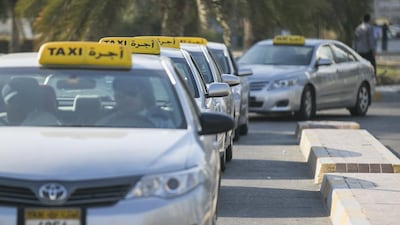ABU DHABI // Security cameras inside Abu Dhabi taxis will curb aggressive driving and the use of hand-held phones among cabbies, help identify fare dodgers and prevent disputes, residents and drivers say.
On Saturday, the Centre for Regulation of Transport by Hire Cars (TransAd) announced a year-long project to install CCTVs in all taxis.
In the roll-out stage, 100 cars will be fitted with cameras. The second phase will be carried out within the year covering the entire TransAd fleet.
“Since the drivers will be monitored, they will drive more carefully,” said Assikhan Abdulkalam, a 27-year-old Indian who drives for an Emirati family. “They will not use their mobile phones while driving, change lanes abruptly or break the speed limit.”
The cameras will enable specialists at the centre to monitor journeys to ensure the safety of the driver and passengers. It will also help in the process of returning lost items.
Shabbir Ali, a secretary who has lived and worked in Abu Dhabi for five years, said the cameras would make taxi rides safer and protect drivers from abusive passengers.
“At the moment, the authorities do not have any idea what’s happening inside the taxi,” said the 39-year-old. “The driver may try to strike up a conversation with a female passenger who is alone in the taxi, or the passenger can be extremely rude and unreasonable.”
Syrian Umm Fadi said she would feel safer with cameras monitoring driver behaviour.
“I often use taxis and some drivers are rude and drive recklessly, so I think it’s a good move,” said the 30-year-old mother of three.
The cameras will also be used to settle any claims made by passengers against drivers, said Nicholas Ssembuya, a Cars Taxi driver for 16 months.
“Some passengers make false statements to TransAd when they lodge a complaint,” he said.
“The officers at the investigation unit of TransAd can review the footage to determine who’s at fault.”
Rajendra Kumar, 40, a National Taxi driver, said some passengers were argumentative and ran off without paying.
Jeevan Kumar Dhungana, 31, an Emirates Taxi driver for two years, agreed.
“When taxi drivers drop passengers in Baniyas, Al Falah and other areas outside the city, they would leave the taxi without paying. It has happened many times.”
TransAd began installing the back-facing, front-mounted cameras in various vehicles types, including the new Mercedes Vito Compact taxis, last week.
The cameras will be on around the clock with the footage recorded and streamed live to the TransAD monitoring station and the government monitoring centre.
Research conducted by the taxi authority showed a need for in-car surveillance for safety reasons.
There are more than 7,000 silver taxis in the emirate, six special-needs vans, 220 airport vans and 270 Mercedes Vito Compact vans.
The new vans with sound-proof privacy glass and an intercom system are being fitted with two cameras.
rruiz@thenational.ae

